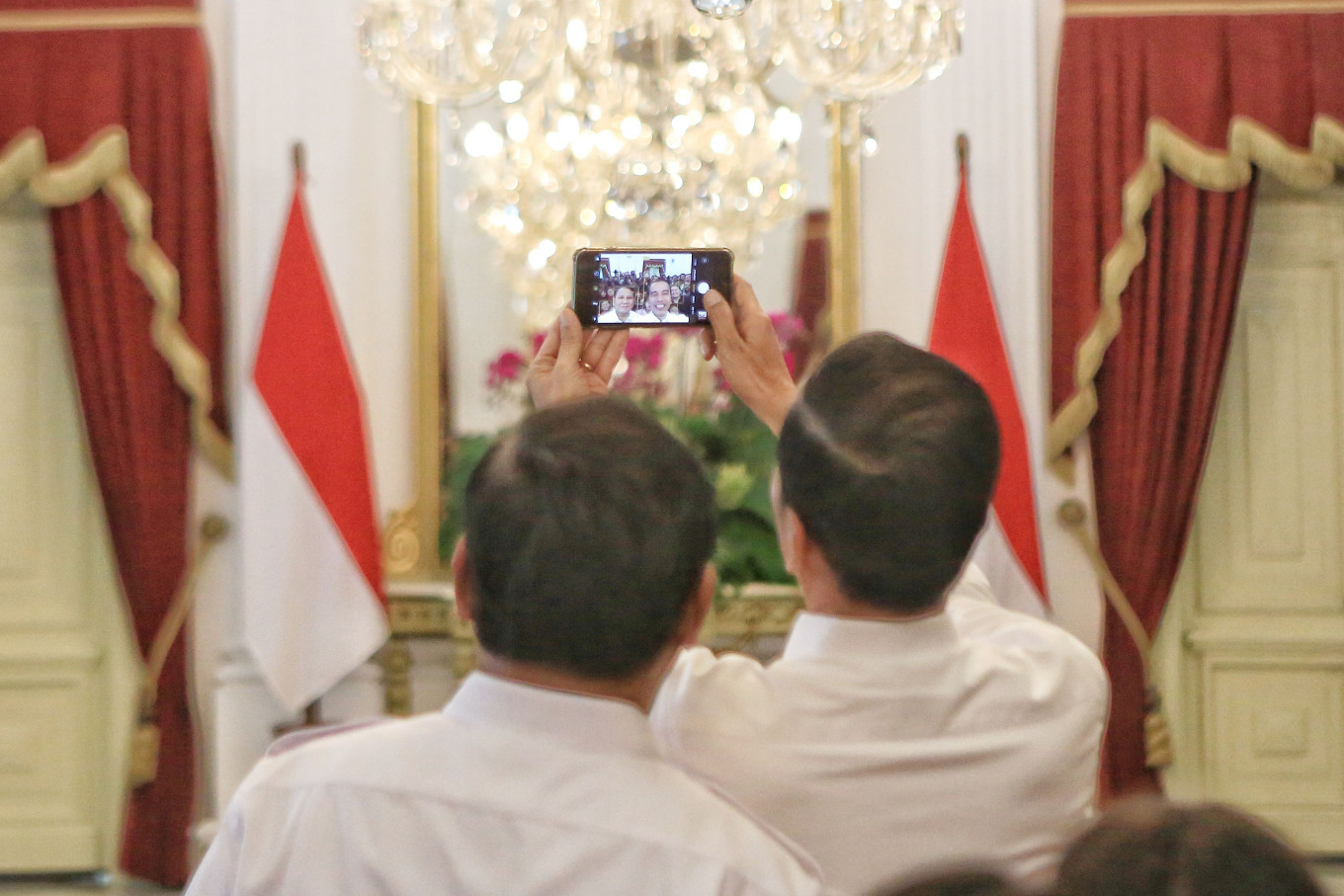Popular Reads
Top Results
Can't find what you're looking for?
View all search resultsPopular Reads
Top Results
Can't find what you're looking for?
View all search resultsLess polarized Indonesia offers some respite for democracy
At a time when people are lamenting the declining quality of democracy, bridging the divide has given Indonesia breathing space, which it should use to reverse the trend.
Change text size
Gift Premium Articles
to Anyone
T
he brutal social media exchange between supporters of Prabowo Subianto and Joko “Jokowi” Widodo stopped last week as soon as the news arrived that Jokowi had appointed Prabowo as defense minister in his new Cabinet.
The diehard supporters of both camps, who waged a fierce battle during the 2019 presidential race, continue the fight, but rather than attacking their opponents, they are aiming their anger at individual candidates. This, too, will come to pass, as soon as they realize they are not going to change anything.
But how could Jokowi name his long-time political nemesis as the defense chief? And how could Prabowo succumb to serving as Jokowi’s assistant? Many supporters must feel betrayed, especially since they had gone out on a limb during the campaign period.
The violence some Prabowo supporters incited in Jakarta when the election results came out in May reminds us how far they were willing to go. Similarly, Jokowi’s huge army of volunteers made it clear that they were prepared to go to greath lengths in this political war to defend his victory.
Indonesia was never so polarized in all its 74 years of independence. The nearest it came was in the 1960s between the pro- and anti-communist forces, but the nation was not as divided as it is today.
The 55 percent votes for Jokowi in April split the nation almost down the middle. And this was only a slight shift from the 53-47 split between the same candidates in 2014.
The decision for the two political rivals to work together after the election, albeit not as equals but more like a boss and an assistant, has had an unintended consequence: It ended popular polarization as we know it. At least for now.
At a time when people are lamenting the declining quality of democracy, bridging the divide has given Indonesia breathing space, which it should use to reverse the trend.
Bringing Prabowo into the Cabinet may have been the wrong decision and detrimental to democracy as many have argued, but it has also stopped the people from waging war on their behalf. From this point forth, it really is a fight between the two men, with the political elite behind them.
Many of their supporters are still wondering if they were duped by their candidates, especially if they got nothing out of this deal. But at least they now know that they can stop fighting, on social media or elsewhere. For most people, 2024 is still a distant future and it is likely to be a different battle. They can all go back to their normal lives.
This is unlike 2014, when the two camps remained in a fighting mood after the election, with Prabowo and his Gerindra Party leading the opposition in government. By joining Jokowi this time around, Gerindra has strengthened the government coalition of six parties, which control more than 75 percent of the 575-seat House of Representatives.
Many analysts have drawn parallels between Indonesia and other countries whose democracies have also been undermined by increasing polarization, which typically happens in two-party systems and in nations divided along conservative-liberal ideological lines.
While Indonesia follows a multiparty system, its polarization was never about ideology, but about the personalities of the presidential candidates. With the same two horses running the last race, the divide went deeper as the supporters of Prabowo and Jokowi renewed their fight ahead of this year’s election.
Ideologically, it is hard to tell Jokowi and Prabowo apart. They are both equally guilty of using identity politics to woo Muslim voters that, in the end, they canceled each other out. Prabowo relied on the militancy of conservative Islamist groups like the Islam Defenders Front, while Jokowi depended on Nahdlatul Ulama to mobilize Muslim voters. Prabowo won much of Sumatra and West Java while Jokowi carried Central and East Java, but that is as far as polarization went.
It may be worth recalling that the nation was not as divided in the 2004 and 2009 elections, contested respectively by five and three candidates.
With Jokowi constitutionally barred from running again in 2024, we are likely to see much less polarization then, especially if the system allows for more than a two-horse race.
With little or no polarization, however, there is room for democracy to improve in the next five years.










